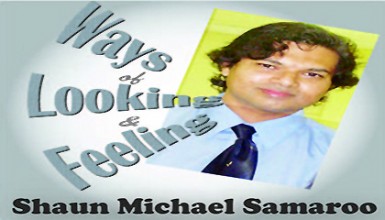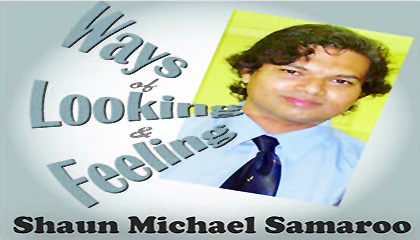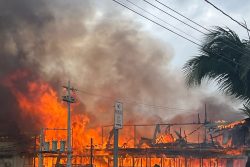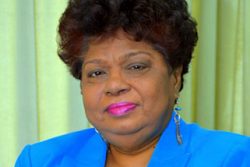We politicize everything in this society. Unless we see institutions as dynamic, organic bodies, each working to achieve unique goals unhinged of sinister political motives, we would not move forward.
We must cultivate institutions that would transform our nation so we achieve our great Guyanese potential.
 Government’s mandate is to govern the society, to ensure social justice with its dependency on law and order, rather than anarchy, plays its rightful role.
Government’s mandate is to govern the society, to ensure social justice with its dependency on law and order, rather than anarchy, plays its rightful role.
Citizens should not see Government as a political entity, but rather as servant of the people, managing a State structure that tries its best to foster goodwill, excellence of public service, and a safe social and natural environment that empowers, motivates, inspires citizens to build meaningful lives.
Our politicians are fallible, weak human beings just like us. So Parliament’s role should not be one of political partisanship. City Council cannot be a playing field for a wicked game of political football.
Local municipalities and villages and communities across the country cannot passively function as pawns in a national political drama.
We must rid this society of political gamesmanship. Such a stultifying way of being leaves us handicapped and severely disabled.
We narrowly insist on a national view whereby citizens see politics as the panacea for all the ills in the society, as if politicians are omnipotent, god-like creatures.
Guyana suffers not from bad politicians, but rather from our horrifying brain drain, a catastrophic crisis of human resource capital so severe and devastating that every facet of this society falls apart, gutted of skills, knowledge, expertise and talent. It’s not the politician who would fix that. It’s us, seeing the problem, designing the solution, and making it become reality.
Shakespeare’s political play, Coriolanus, shows us how stunted and dull a politicized society becomes, not unlike George Orwell’s dystopian novels ‘1984’ and ‘Animal Farm’. As much as the metaphor of the body politic applies to the Guyanese society today, our nation must get over this penchant for seeing ourselves through the presupposition of a political prism.
Glancing through our history, we see everything paved, tainted and painted with politics. Even the writing of our national poet, Martin Carter, failed to escape this politicizing of the Guyanese nation.
Of course, we’ve had terrible governance, when politicians took hold of the reins of power and strangled our democratic freedoms, denying us free and fair elections and free expression. Our history is littered with the excesses of politicians, not least being the 1980 Constitution.
But today, in this 21st century, we can go about our lives building institutions that are absolutely non-political. Maybe such an idea is so new a culture among us that we would take some time to get used to it. But the work of organizations such as Food for the Poor, the Institute of Private Enterprise Development (IPED), the Guyana Foundation of Eric Phillips, Faith Harding’s amazing community projects, and many others, including orphanages, old folks’ homes in Berbice, and other social initiatives, show that Guyanese construct many non-political solutions.
The Private Sector Commission, the Georgetown and Berbice Chambers of Commerce are non-political.
And a lot of Government programmes operate non-politically, including the teachers’ training college, the public education system, the nursing school, the Medical School at the University of Guyana, and youth vocational training programmes under the Ministry of Youth, Culture and Sport at Kuru Kuru College in the Linden area, Sophia in Georgetown, the New Opportunity Corps in Essequibo and in New Amsterdam, Berbice.
Why is it that we insist on looking at life through a political prism, seeing politicians as embodying the answers and solutions to everything? We expect politicians to rid this society of corruption, to clean up the national crisis of morals and ethics in the public space, to heal the harsh, plosive way we talk to each other.
Corruption is our problem, a national crisis, involving State institutions, the private sector, the driver and the policeman, the citizen and the bureaucrat.
We each must grab a broom and mop to clean the dirt that bedevils the Guyanese society. We cannot continue to sit idle expecting the politician at Parliament to shake off the shackles of his or her suit to wipe the muck off the pavement. It’s our job to make our society what we want it to be.
Through free and fair national elections, we elect the political party that we think would best manage the affairs of the nation. These affairs include the macro-economic environment, the social justice necessities of citizens, and the law and order demands of human society.
But instead of allowing the Government we elect to prove itself in its five year term as competent for this task, we heap every concern and every problem at the feet of Government, thus magnifying the power and role of Government in our lives.
We offer to politicians an image of themselves of omnipotent power. So the average politician goes to Parliament not so much to work for us the people, in our best interest, but to parade with pomp and pride his or her pompous self-importance. We thus place the politician on a pedestal of imaginary power, and this pretentious creature, like Shakespeare’s Coriolanus, grows to scorn the common man.
It’s time we bring the Guyanese politician off that pinnacle of perceived power, and invest our energies in citizen-initiatives and citizen-solutions that, instead of pampering to the politicians, mandates the elected official to listen to us, and to toe the line.
We elected a Government to govern us, and a Parliament to make things happen for the society to grow and develop: not a group of politicians to lord their sense of self-importance over us. We must get this message to Parliament and to City Hall and to the political parties, loud and clear.
The days of the all-powerful politician have grinded to a halt. Now the individual, empowered with knowledge, creative thinking ability, lifelong learning skills, and equal footing to any official, holds sway in the public arena. The day is now here for Guyanese to see the politician as a servant of the State, not a god to solve our problems.










